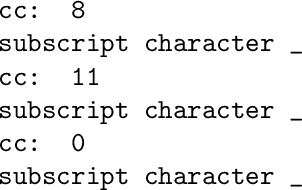joulev

This returns errors.
```
\documentclass{article}
\usepackage{pgffor}
\usepackage{expl3}
\begin{document}
\foreach \i in {0} {
\ExplSyntaxOn
\the\catcode`_, \the\catcode`:, \the\catcode`\ .
\prg_do_nothing:
\ExplSyntaxOff
}
\end{document}
```

```log
/home/joulev/dev/tmp/tmp.tex:10: Undefined control sequence.
\pgffor@body ...tcode `:, \the \catcode `\ . \prg
_do_nothing: \ExplSyntaxOff
l.10 }
/home/joulev/dev/tmp/tmp.tex:10: Missing $ inserted.
<inserted text>
$
l.10 }
/home/joulev/dev/tmp/tmp.tex:10: Missing $ inserted.
<inserted text>
$
l.10 }
```
Here it is very interesting:
* Space has category code 9 (ignored) (as expected after `\ExplSyntaxOn`). However the output still has spaces. I expect it to be "11,11,9." and not "11,␣11,␣9.", because no `~` is provided.
* `_` and `:` have category code 11 (letter) (still as expected after `\ExplSyntaxOn`). So `\prg_do_nothing:` should be a valid control sequence and it should work. It didn't, and the error messages implies `_` is still considered "math subscript" character (catcode 8).
It is even more interesting when I put the whole `\foreach` inside explosive syntax:
```
\documentclass{article}
\usepackage{pgffor}
\usepackage{expl3}
\begin{document}
\ExplSyntaxOn
\foreach \i in {0} {
\the\catcode`_, \the\catcode`:, \the\catcode`\ .
\prg_do_nothing:
}
\ExplSyntaxOff
\end{document}
```

It works perfectly! Also bye-bye the spaces between the numbers.
This means either `expl3` or `pgffor` has a bug. Or I really misunderstood something trivial here.
What is happening?
Top Answer
Phelype Oleinik

No bug, it's all working correctly.
In your first example, with `\ExplSyntaxOn` inside `\foreach`, the tokens in the loop body have their catcodes frozen, so spaces are tokenised as spaces, and `\prg_do_nothing:` is tokenised as `\prg _do_nothing:` (control sequence `\prg` + two subscript tokens and a bunch of letters).
What seems to have thrown you off tracks is the output of ``\the\catcode`\_``: the expansion of `\the\catcode` will return the _current_ catcode of that character, and not the catcode of that _token_. Maybe this helps you see more clearly:
```tex
\def\x{cc: \the\catcode`\_\par \meaning_\par}
\tt
\catcode`\_=8 \x
\catcode`\_=11 \x
\catcode`\_=0 \x
\bye
```
> 
The example above shows that ``\the\catcode`\_`` outputs the current catcode of `\_`, but `\meaning_` always outputs `subscript character _` because that token is frozen.
In your code, even if `\ExplSyntaxOn` changes the catcode inside the loop body, the control sequence `\prg_do_nothing:` is already tokenised incorrectly (not as a control sequence).
Your second example then works correctly because the catcodes are changed _before_ TeX sees the tokens, so `\prg_do_nothing:` is tokenised correctly as a single control sequence. In fact, you could even do:
```latex
\ExplSyntaxOn
\foreach \i in {0} {
\ExplSyntaxOff
\the\catcode`_, \the\catcode`:, \the\catcode`\ .
\prg_do_nothing:
}
\ExplSyntaxOff
```
and the output would be `8,12,10.`